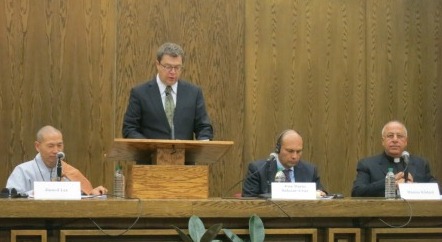





Joe Hepworth, Research Advisor
Brett G. Scharffs, Francis R. Kirkham Professor of Law and Associate Director, International Center for Law and Religion Studies, moderated the Third Plenary Session, titled “Religion in Public and Private.”
Hanna Kildani, Secretary General, Jordanian Christian Council of Churches, Jordan, argued for a balance between religion and democracy in civil society. Christian theology believes that religion serves mankind. Democracy and religion are seeking to bring about man’s happiness. Throughout the ages, religion has played an important role in the development of political institutions and civil society. Religion was never restricted to worship. Civil society should not be left to parliamentarians. There must be balance between religion and democracy.
Father Kildani added a fourth element to religion, democracy and civil society, at least in the Middle East: the land. The Palestinians view the land as Palestinian, while the Jewish people view it as Jewish. Israel has established the first democratic state in the Middle East. In doing so, they have built a wall imprisoning both the Palestinians and themselves. Each group is causing pain to the other. Father Kildani seeks a lasting resolution to the problem, a society where justice and love prevail.
Jinwol Lee, Professor, Dongguk University, South Korea, a Buddhist monk, professor and peacemaker, proposed a culture of peace and justice from an East Asian point of view. Jogye, the major traditional Mahayana Buddhism in Korea, means "top" and "teaching," or supreme teaching. Many languages have different words that can be translated as religion. We should be careful in the way we use words. Some religions focus on the activities of the individual, while others focus on the activities of the group. Religion is also associated with public institutions. The word religion is often used interchangeably with faith. We should appreciate all religions without prejudice, no matter how different they look or sound. That would enable peace and harmony to flourish throughout the world for the common good. Everyone ought to consider others as themselves. In Buddhism, law refers to the truth and the way taught by Buddha. It is like water. It eventually will overcome obstacles in its path.
In response to a question about tsunamis, Professor Lee, suggested that if our mind is peaceful, our actions will be peaceful. If we overcome selfish desires we can take care of others. We cannot stop natural disasters, but we can take care of each other.
José Dario Salazar-Cruz, Senator, Columbia, argued in favor of the family as the founding pillar of society. Abortion, adoption by homosexuals, and other similar issues have come at the expense of support for the family. Judges have made decisions contrary to law, contrary to the family as the center of society. We should recognize that the family is the building block of society. Fighting for the rescue of the family is the proper formula for solving society problems. We should create legal mechanisms to make it possible. As we leave values and principles, permanent problems give rise to unjust society, intolerance, and run counter to democracy and the rule of law.
Currently, families exist generally with difficulty. We have become a society of orphans with living parents, a true societal tragedy. Children are deprived of instruction because the family has been in decline. Children are raised, oriented and receive support in the bosom of the family. Moral values are established in the family. This requires the permanent physical presence of the family. There may be ex-spouses but not ex-fathers or ex-mothers. The family serves functions that cannot be transferred, including teaching respect for life and the unborn. The family is the backbone of society, so when we take the family out of society, we take out the backbone of society.
